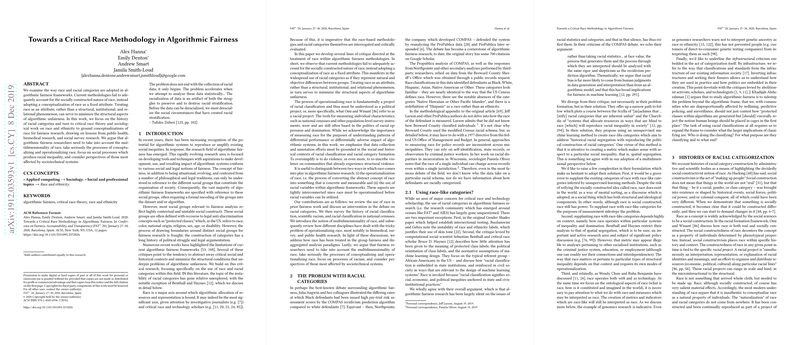Critical Examination of Race in Algorithmic Fairness
The paper "Towards a Critical Race Methodology in Algorithmic Fairness" provides a substantive critique of how race is presently operationalized within algorithmic fairness frameworks. The authors argue that most current methodologies inadequately address the complexity and socially constructed nature of race. This paper makes a methodical argument for a reconceptualization of race within the field, grounded in critical race theory and sociological perspectives.
Critical Analysis of Racial Constructs
The authors emphasize that race is frequently treated as an immutable attribute within algorithmic systems, which they argue is an oversimplification that undermines the structural critique required to address algorithmic unfairness. This treatment neglects the fact that race is a complex, multidimensional construct, embedded in social, institutional, and relational contexts. By examining racial categories as stable and objective, algorithmic fairness research risks reinforcing existing structural inequities.
Historical and Sociological Contexts
Drawing on historical and sociological literature, the paper highlights the instability and socially constructed nature of racial categories. It traces the origins of these categories through the lens of eugenics and state politics, demonstrating how they have been used historically to enforce racial stratification. These contexts underscore the necessity of understanding race as more than a static categorization but rather as a fluid construct informed by social power dynamics.
Multidimensionality of Race
The paper outlines the multidimensional aspects of race, including self-identification, racial self-classification, observed race, reflected race, and phenotype. Each of these dimensions has distinct implications for research outcomes and should be considered in the operationalization of race in fairness analyses. The authors advocate for the adoption of a multidimensional approach that recognizes these complexities and impacts of each dimension on disparate systems and outputs.
Lessons from Other Disciplines
The authors suggest that algorithmic fairness can benefit significantly from the approaches adopted in public health, genetics, and social sciences, where race is treated as a complex, context-specific variable. These fields have developed methodologies to critically examine racial variables, focusing on the social determinants of outcomes rather than race in isolation. Such practices caution against the reification of race and emphasize understanding the socio-political dynamics underlying racial disparities.
Implications for Algorithmic Fairness
This paper critiques group fairness frameworks for their failure to engage deeply with the complexities of racial categorization. It encourages researchers to carefully consider how racial categories are defined and operationalized in fairness studies, to avoid perpetuating the very disparities they aim to eradicate. Disaggregated analysis, while valuable, should not be simplistically applied without accounting for race's ontological and socio-political contexts.
Future Directions
Moving forward, the authors argue for a methodological shift within algorithmic fairness to center the perspectives of those most affected by socio-technical systems. This involves engaging with critical race methodologies and integrating community-based approaches that prioritize the voices and experiences of marginalized groups. By doing so, researchers can work toward developing anti-racist technologies that genuinely address structural inequities.
In conclusion, the paper makes a compelling case for rethinking the role of race in algorithmic fairness by embedding critical race theory into methodological practices. Recognizing the socio-historical and multidimensional nature of race is essential to advancing fairness in algorithmic systems. This approach not only enhances the validity of fairness interventions but also contributes to a more equitable distribution of the benefits and burdens of such technologies.
